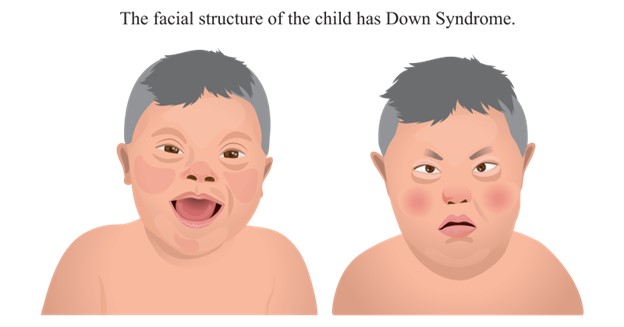While talking with a pregnant woman who has undergone genetic testing, the woman informs the nurse that her baby will be born with Down syndrome. The nurse understands that Down syndrome is an example of:
Trisomy numeric abnormality
Multifactorial inheritance
X-linked recessive inheritance
Chromosomal deletion
The Correct Answer is A
Choice A Reason: Trisomy numeric abnormality. Down syndrome is a genetic disorder that occurs when a person has three copies of chromosome 21 instead of two. This extra chromosome causes various physical and mental features that vary from person to person. Down syndrome is also called trisomy 21 because it involves three copies of chromosome 21.
Choice B Reason: Multifactorial inheritance is incorrect because it refers to a type of genetic disorder that results from the interaction of multiple genes and environmental factors. Examples of multifactorial disorders include cleft lip or palate, neural tube defects, diabetes, hypertension, and some types of cancer.
Choice C Reason: X-linked recessive inheritance is incorrect because it refers to a type of genetic disorder that affects males more than females because it is caused by a mutation on the X chromosome. Females have two X chromosomes, so they can be carriers or affected depending on whether they inherit one or two copies of the mutated gene. Males have one X chromosome and one Y chromosome, so they are always affected if they inherit the mutated gene from their mother. Examples of X-linked recessive disorders include hemophilia, color blindness, and Duchenne muscular dystrophy.
Choice D Reason: Chromosomal deletion is incorrect because it refers to a type of genetic disorder that occurs when a part of a chromosome is missing or deleted. This can cause various physical and mental problems depending on the size and location of the deletion. Examples of chromosomal deletion

Nursing Test Bank
Naxlex Comprehensive Predictor Exams
Related Questions
Correct Answer is {"dropdown-group-1":"D","dropdown-group-2":"C"}
Explanation
Choice A Reason: Preeclampsia is a condition in which a pregnant woman develops high blood pressure and proteinuria (protein in the urine). It can lead to serious complications such as eclampsia, which is seizures caused by preeclampsia, and HELLP syndrome, which is hemolysis, elevated liver enzymes, and low platelets. The main risk factor for preeclampsia is chronic hypertension, which means high blood pressure before pregnancy or before 20 weeks of gestation. Preeclampsia can be detected by measuring the blood pressure and urine protein level. Uric acid is not a reliable indicator of preeclampsia.
Choice B Reason: Gestational diabetes is the correct answer as explained above.
Choice C Reason: Eclampsia is a severe complication of preeclampsia that causes seizures and can be fatal for both the mother and the baby. It usually occurs after 20 weeks of gestation or during labor or postpartum. The main risk factor for eclampsia is preeclampsia, which means high blood pressure and proteinuria during pregnancy. Eclampsia can be prevented by treating preeclampsia with antihypertensive drugs and magnesium sulfate, which is a medication that prevents seizures. Magnesium sulfate can also lower the serum magnesium level, which is the amount of magnesium in the blood. However, magnesium level is not a diagnostic criterion for eclampsia.
Choice D Reason: Placenta previa is a condition in which the placenta covers part or all of the opening of the cervix. It can cause bleeding during pregnancy or delivery and can endanger both the mother and the baby. The main risk factor for placenta previa is previous cesarean section or other uterine surgery, which can cause scarring or damage to the uterine wall. Placenta previa can be detected by ultrasound, which is an imaging test that uses sound waves to create pictures of the uterus and placenta. Hemoglobin is not a relevant factor for placenta previa. Gestational diabetes is a condition in which a woman develops high blood sugar levels during pregnancy. It can cause complications for both the mother and the baby, such as macrosomia, hypoglycemia, and birth trauma. The main risk factor for gestational diabetes is glucose intolerance, which means the body cannot use glucose effectively. Glucose intolerance can be detected by measuring the serum glucose level, which is the amount of glucose in the blood.
Correct Answer is B
Explanation
Choice A Reason: Linea nigra is a dark vertical line that appears on the abdomen of some pregnant women. It is caused by increased melanin production and usually fades after delivery.
Choice B Reason: Pica is a condition in which a person has an abnormal desire to eat substances that are not food, such as ice, clay, dirt, or chalk. It is more common in pregnant women and may indicate a deficiency in iron or other nutrients.
Choice C Reason: Ballottement is a technique of palpating a floating structure by bouncing it gently and feeling it rebound. In obstetrics, it can be used to detect the presence of the fetus by feeling its head move when the cervix is tapped.
Choice D Reason: Quickening is the first perception of fetal movements by the pregnant woman. It usually occurs between 16 and 20 weeks of gestation.
Whether you are a student looking to ace your exams or a practicing nurse seeking to enhance your expertise , our nursing education contents will empower you with the confidence and competence to make a difference in the lives of patients and become a respected leader in the healthcare field.
Visit Naxlex, invest in your future and unlock endless possibilities with our unparalleled nursing education contents today
Report Wrong Answer on the Current Question
Do you disagree with the answer? If yes, what is your expected answer? Explain.
Kindly be descriptive with the issue you are facing.
